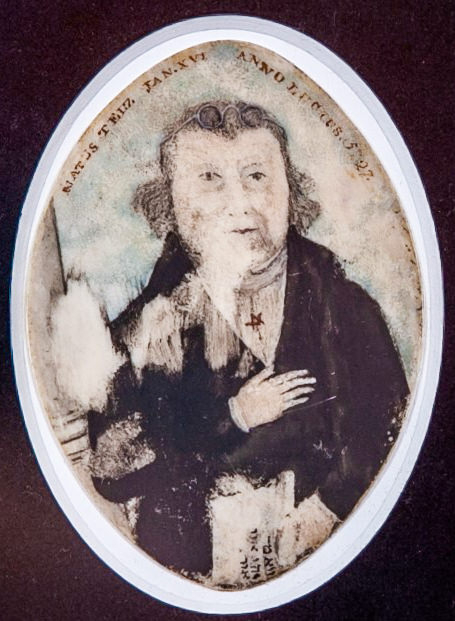One of a very few Jews truly learned in the Torah in colonial America, Mordecai Moses Mordecai was perhaps unique in having arrived from Lithuania. At the time, most of America’s small Jewish population were Sephardim by way of Holland, England, and the Caribbean, or else Ashkenazim from Germany. Mordecai by contrast was born in the village of Teltz, on the shores of Lake Mastis, a descendent apparently of a rabbinic line.
He settled came to Pennsylvania, probably in the mid-1750s. Historian Malcolm Stern speculated that he styled himself Mordecai Moses Mordecai around this time in order to avoid confusion with Moses Mordecai of Philadelphia, father of Jacob Mordecai, whom he undoubtedly knew. In 1761, in Easton, Pennsylvania, he married Zipporah de Lyon, sister of Isaac. They would have seven children. They first settled in Lancaster, Pennsylvania, and by 1770 they were residing in Baltimore, where he became a distiller, though apparently not with great success. Mordecai was, like so many others, also very active freemasonry.
With the Revolutionary War, Baltimore and other coastal cities were subject to British raids with increasing frequency. The Mordecai family, like so many families from Baltimore, Newport, New York, Charleston, and elsewhere, sought refuge in Philadelphia. With the majority of American Jews congregated in one place, Mordecai’s Judaic knowledge became a great resource. He was one of the signatories to the plan to construct a synagogue for Congregation Mikveh Israel, and he was tasked with writing letters in Hebrew to Sephardi congregations in London and Amsterdam, seeking approval for the designs. He also corresponded with disparate communities, including in Surinam, seeking contributions for the building.
As he was increasingly seen—and saw himself— as a religious authority, he became embroiled in controversies. He was one of three people to rule on the question of whether Mikveh Israel’s minister, Gershom Mendes Seixas, could officiate the wedding of Jacob I. Cohen and the widow of the other Moses Mordecai, since she—Elizabeth Whitlock Mordecai—was a convert to Judaism and kohanim are forbidden to marry converts. Mordecai and one of the other members of the tribunal declared that the marriage could not take place, although it would, in 1782, even if outside the congregation. Cohen, however, retained a lot of influence, and exacted some revenge on Mordecai by ensuring his appeal to become shamash was rejected, which came as a great shock to the applicant.
In the years to come, however, Mordecai would more often find himself on the other side of such controversies, taking a far more liberal attitude toward marriages between Jews and gentiles. In 1784, for example, he was brought to Easton, where his niece Judith, daughter of Myer Hart, had, a couple years earlier, secretly married a non-Jew, Lieutenant James Pettigrew. When he found out, her father had stopped speaking to her, but now that young woman was pregnant, her mother was eager to make amends. Mordecai apparently married the couple in a Jewish ceremony, and though Pettigrew had not converted, it was enough to satisfy Hart. When Barnet Levy reported this to Simon Nathan and Benjamin Nones, saying that Mordecai had even signed a ketubah, a congregational court was convened, and it found Mordecai guilty.
He protested the court’s verdict and wrote indignant letters. And again, one year later, he found himself at the center of another squabble, when a Jew named Benjamin Moses Clava—not a member of Mikveh Israel—died in March 1785. Though he had been married by Christian minister to a non-Jew, he had, before his death, recited the Viddui, or confession of faith. A congregational tribunal—on which Mordecai, unsurprisingly, was not asked to serve—had to determine whether Clava could have a traditional burial and decided that he could be buried in a corner of the Jewish cemetery without the ritual washing, shroud and ceremony that are essential to the Jewish custom. In complete disregard to the ruling, Mordecai washed and clothed the body and provided a customary burial.
Excommunicated after these transgressions, and the war having come to an end, Mordecai moved to Richmond, Virginia, where his name appears among the founders of congregation Beth Shalome in 1789. By 1799 he was again living in Baltimore and again operating a distillery. On March 4, 1807, he presided over the wedding of his granddaughter Judith Russell, daughter of Esther Mordecai and Philip Moses Russell, and Isaiah Nathans. Two years later he passed away.
